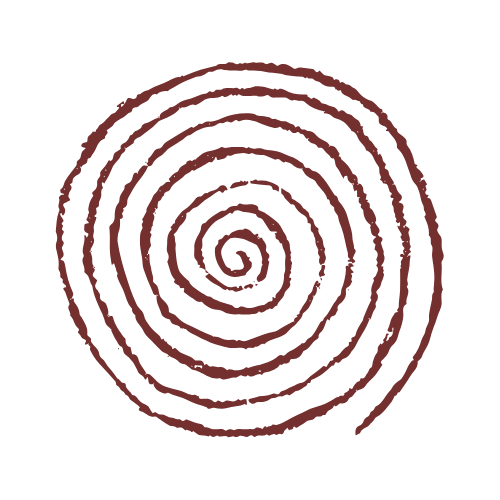Self-improvement is a Chinese finger trap (part 1)
Unmasking the wellness industry’s favorite lie: your sadness is your failure.
At The Body Knows, we’re trading self-improvement for self-trust, and rooting personal development in collective liberation. Subscribe to receive a post in your inbox every week. And give this post a ♥️ or 🔁 to help our message spread!
I’m embarrassed to admit it, but I was an unhappy mermaid.
Picture it with me: Summer of 2018 I was frolicking around a Caribbean cove in a silicone tail as toddlers squealed and pointed from the shore. The water and the air were both 80 degrees, I was living out a childhood dream, and I was being well paid. Yet between tail flips and sunning myself on rocks, I couldn’t stop thinking, This is it. You made it. Life is so good. So why aren’t you fucking happy yet??
I had anxiety, and it ruled my life. For about a decade, my gut was clenched tight enough to make a diamond. Didn’t really matter what was happening, my brain could and would find a way to spiral about it. Perfectly lovely days were ruined by panic attacks precipitated by things as small as too many tabs open on my computer. Yet the entire time, I was fighting my anxiety tooth and nail.
First by trying scientifically researched interventions —
I went to therapy (CBT, EMDR, psychoanalysis). I took medication. I ran, lifted weights, watched what I ate and consumed digitally. I focused on physical sensations when my emotions got overwhelming. I built routines, support networks, and coping mechanisms I could turn to when emotional equilibrium was but a dream.
Then by experimenting with personal development and wellness —
I wrote gratitude lists, and then fear inventories. I cut out gluten, dairy, alcohol, and birth control. I took CBD, detoxed, and fasted. I did breathwork and cold plunges, 5am vinyasas and morning pages.
And eventually by turning to that special brand of psuedo-psychological, “healing journey” spirituality that has taken over Instagram —
I went to Peru and sat with ayahuasca. I learned about generational trauma, nervous system regulation, authenticity, soul. I sought internal alignment rather than external validation. I went on shadow work journeys and self-parented my inner child. I walked the Camino de Santiago through Spain, then moved to the Caribbean based on my intuition, and built a life around soaking in aquamarine waters everyday.
But through the many modalities, journals, and ceremonies, my belief stayed consistent: feeling better was just a matter of doing better.
That’s the ethos of self-improvement, and it’s intoxicating as hell — your happiness is in your hands.
God, it sounds so great, doesn't it? Even when circumstances are out of your control, you can still shift your perspective, improve your attitude, and make lemonade. Just focus on the right things, think the right things, do the right things, and eventually you will feel the right way: happy.
But here’s what I finally realized after a decade of trying every healing hack short of exorcism: self-improvement is a Chinese finger trap.
You know those woven bamboo tubes it’s fun to taunt little kids with? You stick your fingers in both ends and when you try to pull them out, the tube tightens its grip. The harder you pull, the more stuck you become. The only way to get free is to do the opposite of what your instincts tell you — to push your fingers inward, creating the slack that allows for release.
Self-improvement operates by the same mindfuckery. The harder you strive for happiness, the more acutely you feel every flaw, inadequacy, and uncomfortable emotion. The more desperately you try to fix yourself, the more broken you feel.
Welcome to Part 1 of a two-part series where we first gleefully disembowel self-improvement culture and then build something truly beneficial in it’s place. You’re in the disemboweling part, so grab your popcorn and settle in.
There’s a lot to unpack here, but let’s start with the bedrock of self-improvement: taking your power back.
The Instagram/podcast narrative goes something like this: All you have to do to achieve “creator consciousness” is shed your scarcity mindset, victim mindset, fixed mindset and turn your face toward the open horizon... Smell that? That’s possibility.
In theory, I’m a big fan of empowerment. It does feel good to focus on what I can control versus what I can’t. But when wielded without nuance, empowerment casts a dark shadow. Because we can’t say “your happiness only relies on you!” without quietly believing that when you feel anything that ranks below happiness, it’s also only due to one thing: personal failure.
Not your soul-crushing job or heart-shattering breakup.
Not your hormonal cycle or the current political administration.
Not the fact that big tech has turned us all into dopamine-addicted lab rats.
Not because feeling things besides serene, grateful, and motivated is a natural, normal part of being human. (More on that in a bit.)
No. According to self-improvement culture, feeling bad means you've failed.
Don’t get me wrong, I’m not saying we should swing to the other end of the spectrum and all become victims of bad moods and circumstance. In particular, long-term struggles like depression and anxiety are real issues that I don’t believe should be life sentences that their bearers just have to learn to deal with.
But having climbed out of the quicksand of my own anxiety, I can tell you what definitely took my “mental illness” from bad to worse: believing that if I just got my head out of my own ass, I’d be happy.
So why would this version of empowerment become some widespread while it’s so clearly … disempowering?
When I was doing research for this essay, I came across something fascinating. The Stoic philosopher Epictetus, teacher of Seneca, whose teachings power the modern bro mindset movement, was born a slave in ancient Rome. His very name means "acquired," as in property.
Let that sink in.
A man who couldn't change his external reality created a philosophy that preached focusing inward instead. Makes sense. But these days we live in a society where we can improve our circumstances… Right? Right??
When reading about Epictetus, I couldn’t shake the eerie feeling that the resurgence of Stoicism is a telling side-effect of the capitalist-oligarch age we’ve found ourselves in. "It doesn’t matter that you are not free, a slave, imprisoned. You do not even possess things, but that’s okay; you should not be attached to external things anyway. Focus on yourself and try to improve your soul," philosopher Mark Coeckelbergh summarizes in his book, Self-Improvement. In other words, don’t question the structure of your life, your community, your society. Just retreat into an inner, impenetrable castle where you are, in theory, all powerful.
How convenient for the powers that be, for the privileged of society, and for the corporations who sell us our own wellness. I don’t care if the Illuminati did or didn’t plant Stoicism quotes all over Facebook. If people with money are benefiting from something, its going to get ensconced.
Now, you may have noticed my “healing journey” did include changing my external circumstances. But I never imagined challenging the system of thought I was existing in. The one of personal empowerment (and responsibility) that says, “The way this world works is fine. If you don’t feel good, you’re the one that’s broken.”
Maybe it’s time we update our “live life good” philosophy from that of an enslaved man, to one that embraces the collective responsibility to ensure that a baseline of wellbeing is accessible to all.
… breathing break …
Which brings us to the next ring of the finger trap: the moral imperative of happiness.
Let’s get this straight —
Happy is not the emotional equivalent of success.
Happy is not a sign that you have accomplished a lot, nor that you are a spiritual gangster.
And being happy all the time is DEFINITELY not normal. We all know people who profess to be, and we all know that they are both full of shit and pretty annoying. Happy is pleasant and fleeting, that is all.
But while most of us recognize that steady-state happiness is a myth akin to the tooth fairy, we go on believing we should be on the pleasant side of the emotional spectrum as much as possible.
“You deserve to be happy!” and all that.
Actually, you deserve to live a life you find fulfilling and satisfying. You deserve to spend time with people who cherish your open-hearted kookiness. You deserve to have work, hobbies, or relationships that help you feel alive and expressed. And all of those things are at least partially in your control. Dump the bum, quit the soul-sucking job, move to the Caribbean. But babe, it’s still going to rain sometimes.
And you know what isn’t going to help when it’s raining? Refusing to admit it’s raining, trying to stop the rain from falling, villainizing the rain, or making the rain a sign of your personal short-comings. Those are going to make rainy days waaaaaay worse.
We've conflated having some agency over our circumstances with having total control over our inner weather. And then we added the moral layer: you should be able to figure this out. If you're still struggling, you just haven't tried hard enough.
In Buddhism, they call this the second arrow. The first arrow, the one shot by life — the bad news, the injury, the challenge — causes pain, grief, fear. The second arrow is the one we simply decide to stab ourselves with, when we judge ourselves for how we feel or handle the pain of the first arrow. And the second arrow is the one that turns pain into suffering.
I’ve reached a new level of ease with my anxiety in the last couple of years — yes, EASE — because:
I stopped meeting my anxiety with shame, repression, or a “push through” attitude
I learned my anxiety has less power over me when I admit it exists, even if that’s just to myself
I realized when my anxiety surfaced, I was turning on myself — “what’s wrong with you, get it together” — rather than letting it express what it needed to express
In other words, I stopped whipping myself with the second arrow, hoping that would somehow get my emotions in line.
Yes, I also stopped doing things that amplified my anxiety (aka avoiding the first arrow): auditioning for people's love, squeezing myself into ill-fitting jobs and friend groups, spending time on what seemed impressive rather than what made me cackle with delight. But none of those changes made my anxiety disappear. Nothing has made my anxiety disappear. Because feeling good all the time is — say it with me — an unattainable goal!
All we can do is stop trying to shove anything uncomfortable deep, deep down.

… breathing break …
This truth gets so lost in the self-improvement conversation: what you feel is not a mistake, a monster, nor a blackhole.
Your emotions are messengers, carrying energy that needs to be expressed and information that needs to be received. (For an illustration of this, check out this post I wrote about wrangling a panic attack before I crashed my car.)
Yet we’ve completely lost the understanding that letting these emotions flow is what lets them go. (It’s a rhyme so you can remember iiiiit.)
Your grief won’t end you, but trying to compartmentalize it into that tiny box in the back of your heart will ensure that you don’t live a day without the strain of keeping that lid on tight.
Check right now — is there a tightness in your neck, your shoulders, your chest? Your hips, belly, pelvis? Your jaw, the space between your eyebrows? Are you squeezing anywhere, as if you could somehow hold off the feeling by just… clenching... a little... more?
To bring back the weather metaphor, a rainstorm trapped inside is consuming, crippling, and self-feeding — it gathers energy rather than releasing it. A rainstorm allowed to run its course balances the electricity and pressure of the atmosphere.
I don’t know why but some of us have more sensitive “atmospheres”. At least it seems like me and all my friends need to storm more often than what’s characterized as normal. Maybe we’re neurodivergent, maybe we’re empaths, maybe we’re processing trauma from our pasts, our families, the collective. Or maybe everyone else is repressed AF. Whatever it is, the only thing that has worked for me is flowing with my sensitivity rather than berating it. These days, I express emotional energy a dozen different ways: I do somatic practices where I shake and sway and groan. I put on angsty songs and scream-sing along. I exercise like I’m in a fight (slamming medicine balls into the ground is my salvation). I record “dear diary” voice memos as I hike through forests that remind me I don’t have to be perfect to be lovely. I vent to friends who know how to listen rather than fix. I cry almost every time I feel like it.
My emotions are now weather patterns that move. Whatever is happening inside might not be pleasant, but I can always trust it to change.
Because we are built to process pain and come out the other side.
Just like the plants and animals who shed all but what’s essential, redirect their energy from external production to internal metabolization, and curl in on themselves every winter, we can move through grief, fear, malaise and come out in spring, ready to flirt and flourish.
… breathing break …
Just so we have it all straight, let’s summarize the underlying (incorrect) premises of self-improvement that we’ve unpacked so far:
We should feel happy. Feeling happy consistently is normal.
Unpleasant emotions are to be avoided, suppressed, and hidden. They’re no good for anything, they’re just weakness. Happiness is success.
If you’re not feeling happy, you are doing something wrong. Or worse, you are wrong.
But that’s not all!
In part 2, we dive into the final aspect of self-improvement that will make you say “the fuck??” And then we’ll figure out how the hell to get free.
Consider giving this post a ♥️ or 🔁 to help our message spread!








Loved this read, Leona. Funny how everything coming into my orbit right now and what my body is intuitively feeling is...do less. Do less, and feel. Embodying myself as a buoy in the middle of the ocean in rhythm with the storms. Bouncing, feeling, waves crashing and holding me under...yet still floating. There's such a surrender in that. And then there's calm, before the next storm :)
Love this essay!